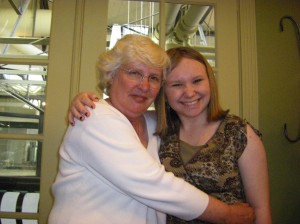Natasha’s Parents Cared for Me
In the orphinige people been mean to me. But girl, Natasha, she very nice. Her parents let me stay her house over night like Friday to Monday. [Natasha was what the Russians called a “Home Girl.” Her parents couldn’t afford to keep her at home, so she lived at the orphanage and went to school Monday morning through Friday afternoon. Then she would go home for weekends and holidays. The Russians have used this system to keep children from starving without severing parental rights. Parents can bring “Home Children” home for good , but it usually doesn’t happen.] Her parents treated me to dinner and make me feel loved, happy, caring. Natasha girl orphinige [my friend, the girl at the orphanage] love me like sister. I treated them respect. I never had family before like girl from orphanage. [Emily’s family was not like Natasha’s.] Her mom and dad [were] very nice. They been respectful. In the orphinige kids been rude to girl orphinige came to orphinige. And did like school work. [Talking with Emily to clarify this part, other orphanage children were jealous of Natasha because she had a family and they didn’t like her because she liked to do her school work.] After Natasha did school work she went home to sleep [on weekends]. First time before, first time they be nice to kids, Natasha’s parents. [From the first time Emily went to Natasha’s house, the parents were nice to her]. I wish my parents [Russian parents] loved me like Home Girl from orphinige. I never thought that my American parents never love me, now they do [not clear on whether she thought we wouldn’t love her, or if by the double negative, she meant the positive]. I just want kids be happy. And also I want Home Girl [Natasha] be happy with [her] parents. I do love my family for always. My parents [American] show me how I want to treat my kids, with respect, love, care. In Russia, family been poor [Natasha’s family]. American family support me more than Natasha. [Since Natasha’s family was so poor, they couldn’t support Natasha as well as Emily’s American family is able to support her]. Family [Natasha’s] didn’t helping me out because they poor, not have any money. Natasha, Home Girl she have a good family. They support her. Even [though] Natasha’s family not have any money or they been poor they still nice to me. Even though my parents [Russian] very abusive, but Natasha’s parents very caring and nice. Natasha Home Girl’s parents did all they could to give shelter, money, love. Natasha parents give Orphinige Girl she always talk to me. Natasha never give up to her home family. [Talking with Emily to clarify: Natasha always talked to Emily and treated her nice even though Natasha was a “Home Girl” and Emily was an “Orphanage Girl.” Natasha, even though she was in the orphanage during the week, never gave up on her family.] Natasha always respectful to others. But me never respectful, before like Natasha [at the orphanage, Natasha was always respectful, but Emily wasn’t]. Natasha went with me grab potatoes from the ground [the orphanage was allowed to glean some potato fields after the harvest so Emily and Natasha worked with other orphans doing this]. Natasha always eat potatoes with me in the orphinige. Orphinige kids been mean to Home Girl Natasha. The staff at Emily’s group home helps her with grammar and spelling for her blog article. Some of them try to preserve her speech and grammar as much as possible, while others will help her every step along the way. Both ways are done for the right reasons. The one type keeps the story more original and helps you to see Emily’s education level and where she would have been had she aged out of the system. A Russian speaking tutor that we hired when Emily and Annie first came home, said that after only three months, their English was better than their Russian had ever been. So, preserving Emily’s words as best as possible helps you to see how challenged some of these kids would be, aging out of institutional care and onto the streets. (Emily was fifteen and a half when she came home, only six months away from aging out of the system). Some of Emily’s staff members like to help her make the article cleaner and plainer so that she feels more comfortable with the presentation. That makes her feel less self-conscious. You will see both presentations as you read Emily’s blog. I will always use brackets to clarify as much as I can, when needed. As I asked Emily, this week, what the message behind the story was, she told me that people who don’t have much money (like Natasha’s family) can still help people by having them in their homes and teaching them about good families, by their example. I hope that you are learning as much from Emily’s blog as I am. If nothing else, it is a glimpse into a very different world.
All of Emily’s blogs
Back to John M. Simmons’ blog

